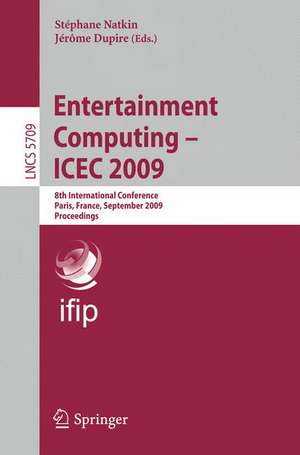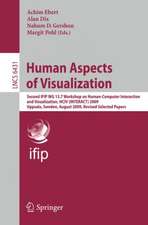Entertainment Computing -- ICEC 2009: 8th International Conference, ICEC 2009, Paris, France, September 3-5, 2009, Proceedings: Lecture Notes in Computer Science, cartea 5709
Editat de Stéphane Natkin, Jérome Dupireen Limba Engleză Paperback – 28 aug 2009
The 14 revised long papers, 19 short papers and 23 poster papers and demos presented were carefully reviewed and selected from 105 submissions for inclusion in the book.
The papers cover all main domains of entertainment computing, from interactive music to games, taking a wide range of scientific domains from aesthetic to computer science.
Din seria Lecture Notes in Computer Science
- 20%
 Preț: 1061.55 lei
Preț: 1061.55 lei - 20%
 Preț: 307.71 lei
Preț: 307.71 lei - 20%
 Preț: 438.69 lei
Preț: 438.69 lei - 20%
 Preț: 579.30 lei
Preț: 579.30 lei -
 Preț: 410.88 lei
Preț: 410.88 lei - 17%
 Preț: 427.22 lei
Preț: 427.22 lei - 20%
 Preț: 596.46 lei
Preț: 596.46 lei - 15%
 Preț: 448.04 lei
Preț: 448.04 lei - 20%
 Preț: 353.50 lei
Preț: 353.50 lei -
 Preț: 389.49 lei
Preț: 389.49 lei - 20%
 Preț: 309.90 lei
Preț: 309.90 lei - 20%
 Preț: 645.28 lei
Preț: 645.28 lei - 20%
 Preț: 763.23 lei
Preț: 763.23 lei - 15%
 Preț: 580.46 lei
Preț: 580.46 lei - 20%
 Preț: 310.28 lei
Preț: 310.28 lei - 20%
 Preț: 655.02 lei
Preț: 655.02 lei - 20%
 Preț: 1183.14 lei
Preț: 1183.14 lei - 20%
 Preț: 340.32 lei
Preț: 340.32 lei -
 Preț: 449.57 lei
Preț: 449.57 lei - 20%
 Preț: 591.51 lei
Preț: 591.51 lei - 18%
 Preț: 938.83 lei
Preț: 938.83 lei - 20%
 Preț: 337.00 lei
Preț: 337.00 lei - 20%
 Preț: 649.50 lei
Preț: 649.50 lei - 20%
 Preț: 607.40 lei
Preț: 607.40 lei - 20%
 Preț: 1414.79 lei
Preț: 1414.79 lei - 20%
 Preț: 1024.44 lei
Preț: 1024.44 lei - 20%
 Preț: 583.40 lei
Preț: 583.40 lei - 20%
 Preț: 453.32 lei
Preț: 453.32 lei - 20%
 Preț: 575.49 lei
Preț: 575.49 lei - 20%
 Preț: 1075.26 lei
Preț: 1075.26 lei - 20%
 Preț: 585.88 lei
Preț: 585.88 lei - 20%
 Preț: 825.93 lei
Preț: 825.93 lei - 17%
 Preț: 360.20 lei
Preț: 360.20 lei - 20%
 Preț: 763.23 lei
Preț: 763.23 lei - 20%
 Preț: 340.32 lei
Preț: 340.32 lei - 20%
 Preț: 504.58 lei
Preț: 504.58 lei - 20%
 Preț: 369.13 lei
Preț: 369.13 lei - 20%
 Preț: 580.93 lei
Preț: 580.93 lei - 20%
 Preț: 343.62 lei
Preț: 343.62 lei - 20%
 Preț: 350.21 lei
Preț: 350.21 lei - 20%
 Preț: 583.40 lei
Preț: 583.40 lei - 20%
 Preț: 583.40 lei
Preț: 583.40 lei - 15%
 Preț: 438.59 lei
Preț: 438.59 lei - 20%
 Preț: 341.95 lei
Preț: 341.95 lei - 20%
 Preț: 238.01 lei
Preț: 238.01 lei - 20%
 Preț: 538.30 lei
Preț: 538.30 lei
Preț: 337.00 lei
Preț vechi: 421.25 lei
-20% Nou
Puncte Express: 506
Preț estimativ în valută:
64.49€ • 70.03$ • 54.17£
64.49€ • 70.03$ • 54.17£
Carte tipărită la comandă
Livrare economică 22 aprilie-06 mai
Preluare comenzi: 021 569.72.76
Specificații
ISBN-13: 9783642040511
ISBN-10: 3642040519
Pagini: 355
Ilustrații: XVI, 344 p.
Dimensiuni: 155 x 235 x 23 mm
Greutate: 0.54 kg
Ediția:2009
Editura: Springer Berlin, Heidelberg
Colecția Springer
Seriile Lecture Notes in Computer Science, Information Systems and Applications, incl. Internet/Web, and HCI
Locul publicării:Berlin, Heidelberg, Germany
ISBN-10: 3642040519
Pagini: 355
Ilustrații: XVI, 344 p.
Dimensiuni: 155 x 235 x 23 mm
Greutate: 0.54 kg
Ediția:2009
Editura: Springer Berlin, Heidelberg
Colecția Springer
Seriile Lecture Notes in Computer Science, Information Systems and Applications, incl. Internet/Web, and HCI
Locul publicării:Berlin, Heidelberg, Germany
Public țintă
ResearchCuprins
Long Papers.- Player Performance, Satisfaction, and Video Game Enjoyment.- Analysis of Area Revisitation Patterns in World of Warcarft.- Scaling the Level of Difficulty in Single Player Video Games.- Dance Motion Control of a Humanoid Robot Based on Real-Time Tempo Tracking from Musical Audio Signals.- Marker-Less Tracking for Multi-layer Authoring in AR Books.- Personal Space Modeling for Human-Computer Interaction.- Technology-Enhanced Role-Play for Intercultural Learning Contexts.- MusicCommentator: Generating Comments Synchronized with Musical Audio Signals by a Joint Probabilistic Model of Acoustic and Textual Features.- MiniDiver: A Novel Mobile Media Playback Interface for Rich Video Content on an iPhoneTM.- Children’s Choice of Games: The Influence of Prosocial Tendency and Education-Level.- Player Experience Evaluation: An Approach Based on the Personal Construct Theory.- A Plot-Manipulation Algebra to Support Digital Storytelling.- Distributed Episode Control System for Interactive Narrative Entertainment.- Virtual Noctiluca: Interaction between Light and Water Using Real-Time Fluid Simulation and 3D Motion Measurement.- Short Papers.- Sound and Movement Visualization in the AR-Jazz Scenario.- Experimenting with Sound Immersion in an Arts and Crafts Museum.- BayesianBand: Jam Session System Based on Mutual Prediction by User and System.- v.morish’09: A Morphing-Based Singing Design Interface for Vocal Melodies.- New Hitch Haiku: An Interactive Renku Poem Composition Supporting Tool Applied for Sightseeing Navigation System.- Using Persuasive Technologies for Energy Consumption Management: A South African Case Study.- Designing Interactive Blimps as Puppets.- Requirements for Supporting Individual Human Creativity in the Design Domain.- Sonic GesturesApplied to a Percussive Dialogue in TanGram Using Wii Remotes.- TNT: Touch ‘n’ Tangibles on LC-Displays.- Entertainment Game to Support Interaction between Teachers and Students.- Multi-layer Based Authoring Tool for Digilog Book.- Community Created Narrations as Mobile Entertainment.- Hardcore Classification: Identifying Play Styles in Social Games Using Network Analysis.- Player Feedback Evaluation: Indicating Mass Public Potential for Pervasive Games.- A Real-Time Video Illustration Using CUDA.- A Distributed Render Farm System for Animation Production.- Extending the Strada Framework to Design an AI for ORTS.- Services in Game Worlds: A Semantic Approach to Improve Object Interaction.- Posters and Demoonstrations.- Glasses-Free 3D Image Viewer by Handmade DIY Craft.- Monocular 3D Vision Using Real-Time Generated Scene with Depth of Field Effect.- RFID Painting Demonstration.- Development and Evaluation of a Digital Vegetation Interaction Game for Children.- 4-Views Display System for Collaborative Tasks on Round Table.- Invisible Two-Dimensional Code Display for Additional Information.- MobiSpell: Educational Mobile Game Design and Development for Teaching Spelling to Young Children.- Live Demonstration of the Pervasive Game “GPS Joker”.- Rapid Interactive Installation Development Using Robust Computer Vision and Image-Based Rendering.- Reinforcement Learning for Blackjack.- “Plug: Secrets of the Museum”: A Pervasive Game Taking Place in a Museum.- In-Game Peer Performance Assessment Role That Fosters Metacognitive Agility and Reflection.- Edutainment Games for Mobile Multimedia Museum Guidance Systems: A Classification Approach.- Orpheus: Automatic Composition System Considering Prosody of Japanese Lyrics.- A Handy Laser Show System for Open SpaceEntertainment.- Sketch-It-Up! Demo.- Automatic Chat Generation of Emotional Entertainment Characters Using News Information.- Incremental Learning Algorithm for Online Action Game System.- Task-Based Second Language Learning Game System.- Designing a Game Controller for Novice HALO3 Players.- AZ66: How Can We Play with Emotions?.- WHO AM I? : A Art Ludic Installation in Virtual Reality.- Affective Interaction: Challenges at the Ubiquitous Computing Times.- Invited Speakers.- You Are Here.- Game Experience May Vary: Understanding Play.- The New Pact: How Online Worlds Forge a New Form of Alliance between Players and Designers.- The International Game Developer Association (IGDA) Education Special Interest Group (EdSIG).- Story of a Video Game Workshop: "Ico", an Interactive Fairy Tale for Children Less Interaction.- Japan’s Arcade Games and Their Technology.
Textul de pe ultima copertă
This book constitutes the thoroughly refereed proceedings of the 8th International Conference on Entertainment Computing, ICEC 2009, held in Paris, France, in September 2009, under the auspices of IFIP.
The 14 revised long papers, 19 short papers and 23 poster papers and demos presented were carefully reviewed and selected from 105 submissions for inclusion in the book.
The papers cover all main domains of entertainment computing, from interactive music to games, taking a wide range of scientific domains from aesthetic to computer science.
The 14 revised long papers, 19 short papers and 23 poster papers and demos presented were carefully reviewed and selected from 105 submissions for inclusion in the book.
The papers cover all main domains of entertainment computing, from interactive music to games, taking a wide range of scientific domains from aesthetic to computer science.












